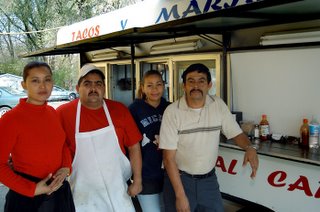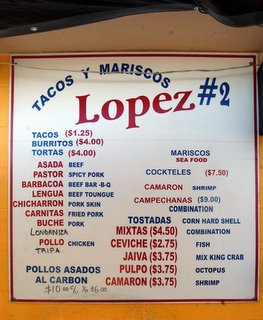 After the recent Carnegie Corporation report on Nashville, the city has received another national mention related to Hispanics, and it's not favorable. The Metro City Council's recent proposed ban of taco trucks and food trailers (stories here, here and here) drew the attention of columnist Ruben Navarrette, who mentioned the ban in this nationally syndicated editorial as an example of irrational acts against Hispanics in 2005. Excerpts of the editorial, which ran in over 200 papers nationwide:
After the recent Carnegie Corporation report on Nashville, the city has received another national mention related to Hispanics, and it's not favorable. The Metro City Council's recent proposed ban of taco trucks and food trailers (stories here, here and here) drew the attention of columnist Ruben Navarrette, who mentioned the ban in this nationally syndicated editorial as an example of irrational acts against Hispanics in 2005. Excerpts of the editorial, which ran in over 200 papers nationwide:"Where's the holiday spirit? I bet that's what a lot of U.S.-born Hispanics are wondering as 2005 comes to an end."
"These are scary times for the nation's largest minority. Everywhere you look, it seems that some Americans are trying to erect more walls, deploy more guards, and whenever possible, roll back the influence of Hispanic culture."
"Maybe it's all about the numbers. There's something about accounting for 40 million people that makes some folks uncomfortable – as if it's only a matter of time before they are edged out for admission to colleges and some of the better jobs. Or maybe what they are afraid of is that their neighborhoods and towns will be overrun and their language, culture and customs will be eroded."
"And when people get uncomfortable, they act irrationally."
"The Nashville City Council considered a proposal by three of its members to ban taco trucks and other mobile food vendors. Supporters of the ban insisted that it was prompted by legitimate health concerns and not by – as critics suggested – a cultural backlash against Hispanics who, according to The Associated Press, operate the majority of the mobile vending trucks in the city. But the council members had a tough time explaining why the ban did not apply to smaller street vendors, such as hot dog carts."
One Hispanic advocate who worked with the bill's proponents called it even-handed legislation and not a racial issue. Others called the ban overkill when existing regulations would suffice, and when mostly non-Hispanic vendors of hot dogs were excluded.
Navarette was recognized in 2005 by Hispanic Business Magazine as one of the nation's 100 most influential Hispanics.





 Photo by
Photo by 





 Two Knoxville papers recently explored the Knoxville Hispanic community in searching, in-depth articles.
Two Knoxville papers recently explored the Knoxville Hispanic community in searching, in-depth articles.







